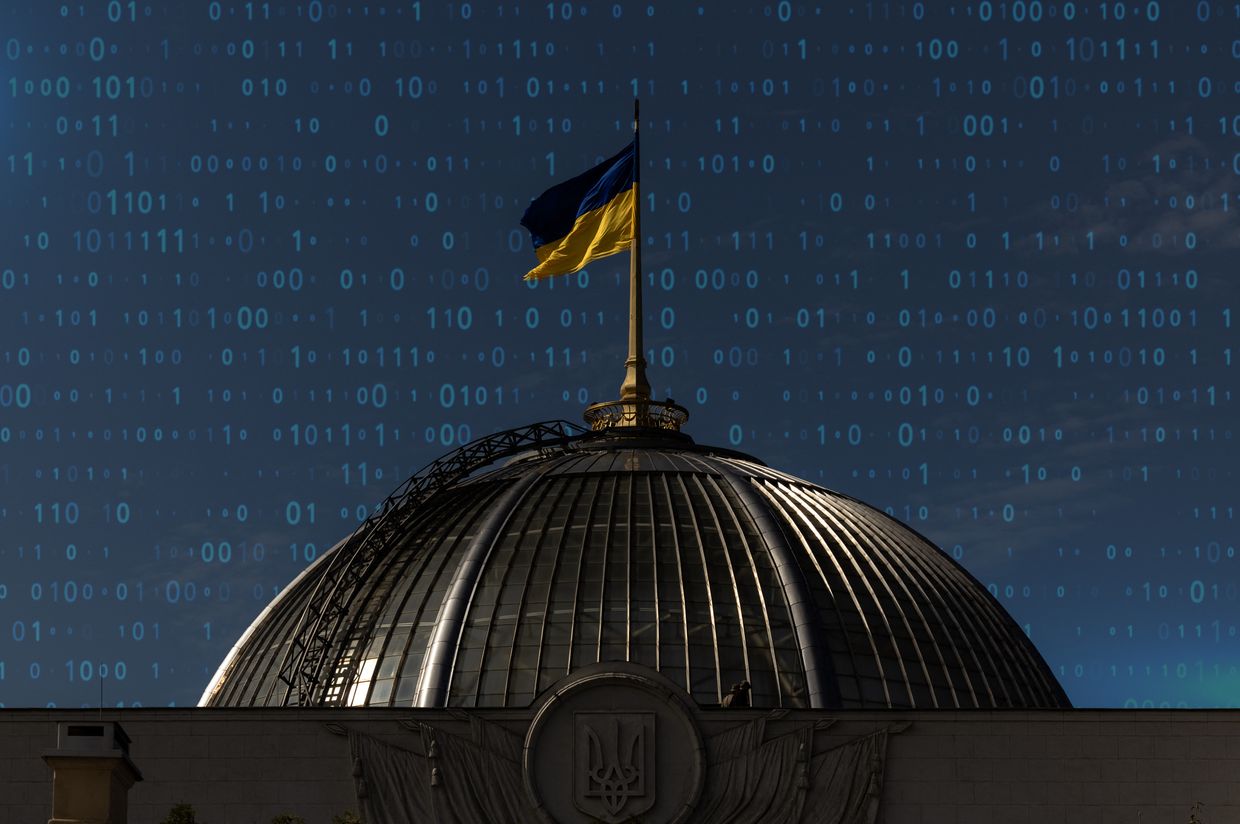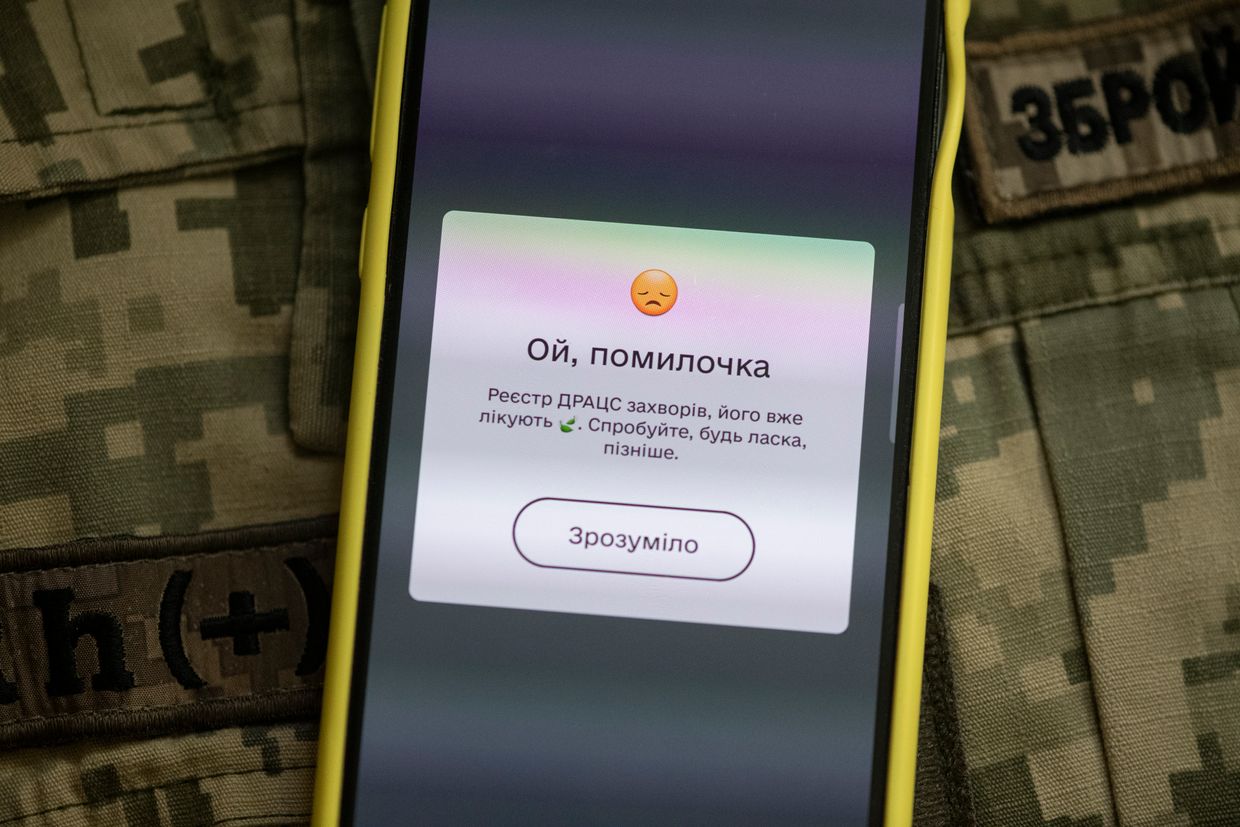
Firstly of December, Ukrainians abruptly discovered themselves unable to promote vehicles, file authorized claims, or register marriages by Ukraine’s lately digitized authorities registries.
Cybersecurity specialist and frequent coordinator of Ukrainian hackers, Karla Wagner, observed when she went to register an NGO by the Ukrainian Justice Ministry.
“I used to be getting inconsistent outcomes from the Justice Ministry web site; I used to be in a position to submit the doc, however I used to be not in a position to digitally signal it. And at first, I used to be aggravated as a result of I'm pondering, yeah, it is a crappy system,” says Wagner.
“I used to be getting completely different outcomes each time, from timeouts to errors to ‘one thing didn't appear to work proper, please attempt once more later.’”
The Justice Ministry on Dec. 19 formally introduced {that a} Russian hack had taken a laundry record of vital authorities databases that had been put underneath the Justice Ministry offline. The databases comprise delicate data from property possession to biometric knowledge to tax data.
Related Ukrainian places of work rapidly known as it an act of battle from Russia. “The data area is likely one of the key instructions of the enemy’s assaults,” wrote the State Communications Service, the nationwide cybersecurity company, in a press release supplied to the Kyiv Unbiased.
“Russian hackers, who’ve turn out to be full-fledged contributors on this battle, are continuously getting higher, enhancing their toolkits, techniques and technique of operations.” The assertion contained no data on the technical particulars as to how the programs had been compromised.
XakNet, a hacking group beforehand tied to Russian intelligence, took credit score for the assault, posting on Telegram knowledge they declare to have hacked from the Ukrainian civil registry. The hackers claimed to have deleted at the least a number of the registry knowledge.
The Justice Ministry has since introduced that each one its state registries had been able to function however that entry to some registers was nonetheless restricted, as their knowledge nonetheless must be up to date. Entry to authorities providers by the Diia app can be out there within the close to future, the ministry mentioned on Jan. 20.
The hack posed a serious informational risk, highlighting how weak authorities and Ukrainians’ private knowledge is to cyber assaults. In pushing to digitize its providers rapidly, the federal government additionally might have taken shortcuts that opened the door to digital onslaughts. Assaults of those varieties additionally erode public belief within the authorities, consultants say.
The core downside, as Wagner diagnoses, was the tempo at which Ukraine rewired programs starting from passports to tax funds right into a single digital portal, all underneath the auspices of the Justice Ministry, so as to present optimistic outcomes to international observers.
“It was very, very, very, very, very quick progress,” says Wagner. “And any IT mission that has the warmth on to make quick progress will minimize corners the place wanted and save assets the place wanted with the perfect of intentions, which is assembly the deadlines and satisfying the necessities. (That) created not solely a protracted string of vulnerabilities but in addition over-centralization in tech admin infrastructure.”

Mykyta Knysh, who previously labored in cybersecurity for Ukraine’s safety providers, the SBU, and at present runs the hacking collective “HackYourMama,” says the companies concerned ought to have recognized higher.
“I perceive that the Justice Ministry doesn’t essentially must have this sort of experience, however the State Workplace of Safety and Communications, the Digital Transformation Ministry, the SBU — they need to have that experience,” says Knysh.
What was hacked and what the hackers may do subsequent
Hardly probably the most eye-catching of Russia’s navy operations towards Ukraine for the reason that full-scale invasion, the assault nonetheless presents a critical risk to Ukraine’s safety.
“If the Russians occupy extra territory they’ll use that data, perhaps to threaten or blackmail or defraud individuals who fall underneath them,” says Knysh.
Knysh hails from Kupiansk, a city in jap Kharkiv Oblast that at present lies inside 5 miles of Russian positions.
The registries attacked included data like people’ addresses and property, in addition to familial relationships. It’s not but recognized whether or not the hackers concerned have truly re-written the knowledge for sure civilians. Knysh fears the hackers might have cast digital identities to grant Russian brokers entry to the entrance.
The hack “gives alternatives for Russian intelligence to acquire extra details about Ukrainian navy and civilian authorities workers, and determine weak or in any other case appropriate individuals in Ukraine who will be recruited or coerced into conducting espionage actions and sabotage,” analysts at cybersecurity agency Flashpoint wrote in a feedback to the Kyiv Unbiased.
The hack "gives alternatives for Russian intelligence to acquire extra details about Ukrainian navy and civilian authorities workers, and determine weak or in any other case appropriate individuals in Ukraine who will be recruited or coerced into conducting espionage actions and sabotage.”
“Nonetheless, extra seemingly makes use of of such data embrace conducting future cyberattacks on different organizations in Ukraine utilizing the knowledge from public registries for reconnaissance, identification theft, social engineering, doxxing, harassment, and crafting convincing phishing emails,” Flashpoint wrote.

Oleh Burba, who works as a part chief for EU4DigitalUA and coordinates registry integration says that whereas something is theoretically doable if Russians have the entry, there’s at present no confirmed data they’ve modified something within the registries.
Although any such impacts have but to materialize, the assault has already proved a serious inconvenience to civil society, which Wagner sees as the most important concern.
“You assault the Justice Ministry and the day-to-day enterprise of presidency can’t go on,” says Wagner. “Okay, no person's going to die if I can't register my NGO. But it surely erodes confidence within the Ukrainian authorities.”
"You assault the Justice Ministry and the day-to-day enterprise of presidency can’t go on."
For Russia, Wagner considers it an extension of a propaganda battle, much like bombardments of Ukrainian nationwide monuments.
“You don't must hit strategic targets in a rustic. All it’s important to do is make it look like ungovernable.”
XakNet hackers additionally claimed to have destroyed backup knowledge in servers in Poland. In its message the hacker group mocks Ukraine’s authorities, saying: “It’s very telling to retailer authorities knowledge on international storage — that’s what independence Ukrainian-style seems like, apparently.”
Single level of failure
The programs affected had been underneath the umbrella of huge digitalization of presidency providers that has taken place underneath the administration of President Volodymyr Zelensky, significantly his Digital Transformation Minister Mikhailo Fedorov.
This digitalization has been enormously in style, largely seen as decreasing alternatives for low-level corruption amongst a patchwork of regional companies dominated by unscrupulous bureaucrats.
However cybersecurity consultants query the knowledge of the technical centralization of those programs inside one workplace, with Knysh jokingly dubbing Fedorov’s company the “Digital Degradation Ministry.”
“At first of the full-scale invasion we realized that Ukraine's digital infrastructure was overly centralized, in accordance with the previous Soviet mannequin,” says Wagner. “Centralization and single factors of failure are a widely known anti-pattern. And it's extremely weak.”
“Centralization and single factors of failure are a widely known anti-pattern. And it's extremely weak.”
“My private opinion was that (the hack) was by this technique, ‘Trembita,’“ says Knysh. Trembita is a core knowledge administration system that gives the backend for presidency programs, particularly Diia, an app that has digitized authorities providers like passports and tax paying.
Knysh helped set up a hack on Russia’s authorities providers portal final yr that amongst different impacts, immobilized digital voting.
Unbiased hackers have been warning authorities companies in regards to the centralization of everybody’s data underneath Diia since 2021.
Trembita manages the digital communication between completely different registries. “Trembita is a visit by rail,” wrote Burba in an op-ed for Financial Pravda defending the system in Could, describing the registries as cities, their digital hyperlinks as railroads, and particular person figuring out codes as tickets.

“Trembita particularly on this state of affairs was not broken or damaged, it functioned simply because it ought to have functioned and guarded the knowledge change between these registries,” Burba advised the Kyiv Unbiased.
Knysh is particularly involved that authorities supplied no particulars on the hack, citing “an entire monopoly on what they’re saying.” On condition that hackers re-use hacking strategies, he was involved for different nations.
It’s not an issue restricted to the Zelensky cyber workforce and Digital Transformation Ministry. Having labored for the Ukrainian SBU underneath former president Petro Poroshenko's administration, Knysh says “Poroshenko was virtually simply the identical,” and acknowledged the necessity for a stronger digitized and federalized system of managing knowledge.
“Earlier than Trembita, there was whole chaos,” says Knysh. “However then they mentioned ‘you’ll have a authorities of smartphones’ and now we now have a authorities of smartphones open to the SBU and HUR,” he continued, referencing Ukrainian intelligence companies.
Hackers can discover backdoors left open to governments, as for instance a collection of authorized battles to compel Apple to extract knowledge for U.S. intelligence companies laid out.
Officers are touting an overhaul, with Justice Minister Olha Stefanishyna dubbing a pending rebuild right into a “Pentagon of registries.”
What precisely a “Pentagon of registries” means is unclear. For Wagner, it’s pretty easy: “Nothing.”
“It’s not an emotionally mature method,” says Wagner, miming beating her chest.
“I heard this (Pentagon of Registries) and I assumed, “Exit and say actually, ‘we don’t know learn how to make a secure system.’”
 The Kyiv IndependentThe Kyiv Independent news desk
The Kyiv IndependentThe Kyiv Independent news desk